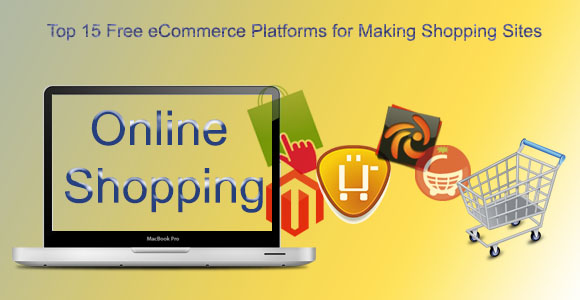Top 15 Free eCommerce Platforms for Making Shopping Sites
The dearth of time to go out and shop today has come in as a blessing for the eCommerce industry, due to which it’s growing by leaps and bounds. Though, the success of an eStore largely depends on the quality of your products, its design, navigation, SEO friendliness, W3C validity, etc., also plays a crucial role. Therefore, if you are planning to launch an eStore to promote and sell your products online, it is essential to utilize the top-notch eCommerce platform, and ask your PSD to eCommerce Template Conversion Company to transform your design accordingly.

In order to make you aware of the top-notch free eCommerce platforms, we have come up with a list of top 15 free eCommerce platforms.
1-PrestaShop
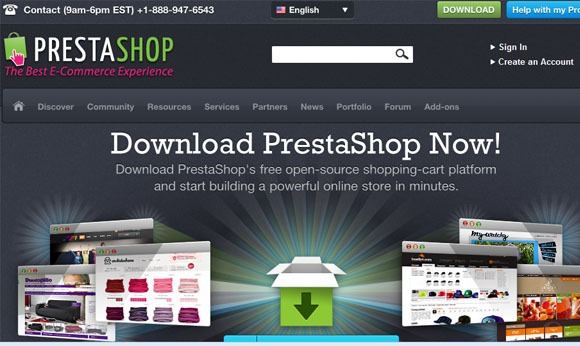
At a price of $0, Prestashop is one of the most preferred eCommerce platforms, as it comes with more than 310 exciting features related to; Catalog Management, Analytics & Reporting, Localization/Taxes, Shipping, Product Displays, Site Management, Search Engine Optimization, Translation, etc. It started in 2007, and since then, it has come a long way, and currently empowers 130,000 online shops. Moreover, it is available in 150 countries and 56 languages, and there are plenty of add-ons that can be used to make your online stores more powerful.
2-Oscommerce
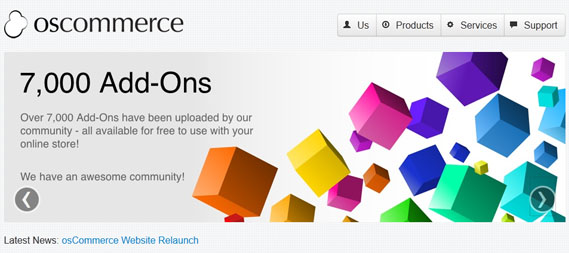
Oscommerce is one of the most prominent and oldest eCommerce platforms as it was launched in the year 2000. It has a strong community of 271,419 expert eShop developers and owners, which are always eager to help a beginner or intermediate. Currently there are 12,800 sites, which have been made using Oscommerce to boost the online presence and business with its highly acclaimed features including the SEO friendly layout. Additionally, there are 7000+ add-ons, which can help you boost your sales and make your online stores more exciting to use.
3-OpenCart
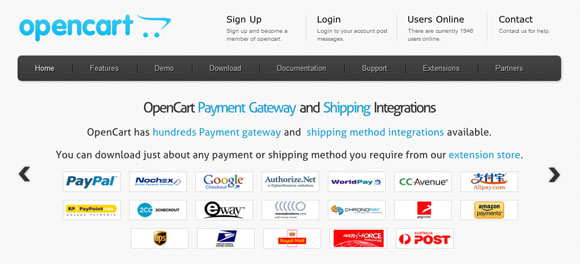
OpenCart is a fully loaded eCommerce platform that lets users launch feature rich eStores, to give matchless online shopping experience to the visitors. It can be installed and configured in a few steps. Once it is completely configured on a website, the respective user can easily add unlimited products, categories, manufacturers, etc., and can list the available products in multi-currency from the backend panel. A discount coupon system, printable invoices, sales reports, shipping weight calculation, multiple tax rates, automatic image resizing are some of its prime features. Additionally, there are 8,217 extensions, which can also be utilized to offer more exciting features in an eShop.
4-Magento Commerce
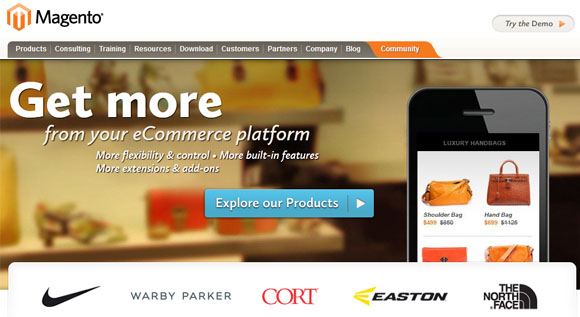
Magento Commerce can be termed as the most popular ecommerce platforms of recent times. It was launched just six years back in the year 2007, and since then it has managed to host 150,000+ online shopping portals. It comes under three plans, namely; Magento Go, Enterprise and the Community Edition. The first two are paid plans, and the Community Edition is free. For a beginner, a great number of articles, tutorials, screencasts, documentation is available for free, and a newly setup Magento based eStore can be easily customized using a wide variety of Magento Extensions, which are available for free as well as paid.
5-nopCommerce
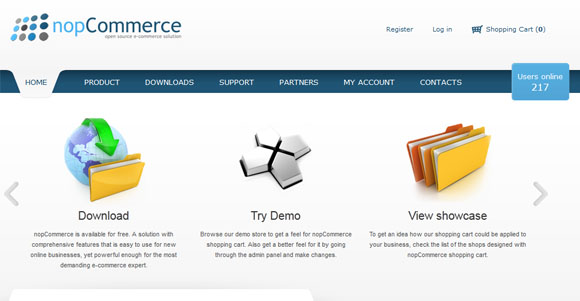
nopCommerce is a fast, flexible and intuitive open source ecommerce platform. It is globally used and famous for a variety of reasons, which includes its pluggable modular/layered architecture that allows supreme functionality and appearance elements to be added dynamically to a website at run-time. It is also a feature rich software, which comes along with a wide range of extensions, which can be integrated in a shopping site pretty easily. Some of its popular extensions are; Shipping by Total, Plugin OnePage Checkout, Click4Assistance (Live Chat), Calculate & print USPS labels, Watermark for nopCommerce, Happy hours discount, and Free Shipping For Orders over X. Additionally, there are plenty of themes, which can be downloaded and installed on a shopping site for free.
6-Ubercart
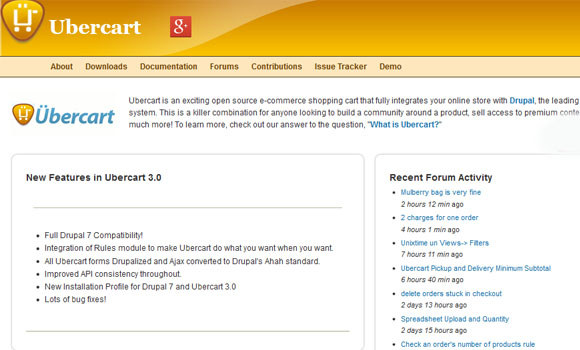
Drupal is one of the most popular and highly secure open source Content Management System, which is also used by various US government departments for their websites. However, making shopping websites on Drupal is not easy, and that’s where Ubercart comes into play. Ubercart is an open source e-cart, which is fully compatible with Drupal, and can be integrated with it in a short period of time. Once you integrate Ubercart with your Drupal based website, you would be able to offer certain features to your visitors, which includes; single page checkout, automatic account generation, simple order processing, activity logging, etc.
7-Zen Cart
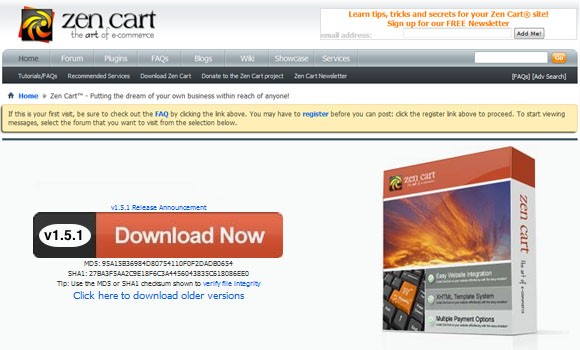
It was in June 2003, when Zen Cart came into existence, since then it is being developed constantly. According to the trends report listed on Builtwith.com, Zen Cart is a home to 116,354 eShops, and approximately 41,000 of them are amongst the most visited websites on the Internet. The best thing about Zen Cart is that even a novice can download and install it on a root domain, and setup an eCommerce portal with it. And when it comes to offering superior functionality to the visitors, Zen Cart stays ahead of many of its competitors, as there are hundreds of plugins, which can be integrated in a website like; Language packs, buttons and graphics, pricing tools, marketing tools, admin tools, shipping modules, sideboxes, etc.
8-Tomato Cart
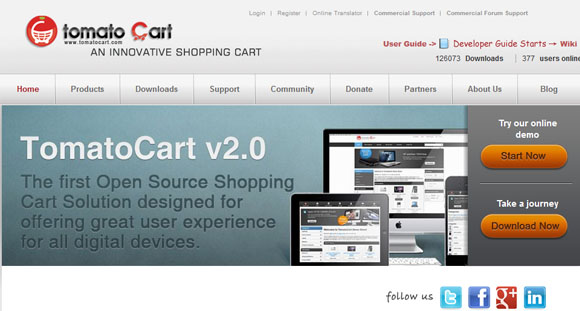
It is a next generation eCommerce platform, which is being developed and maintained continuously by a massive community of 64,000+ users located in 50+ countries. With tomato cart, one can easily offer a highly customized eStore on the web. It comes with a variety of features, which are related to Statistics and Reports, Product Promotion and SEO, Payment, Shipping, Order and Customer Management. These features are available and can be utilized for free of cost. Moreover, there’s one extension manager, from where you can download and install more than 200 extensions to your online store, which will improve the overall functionality of your eshop.
9-Spree
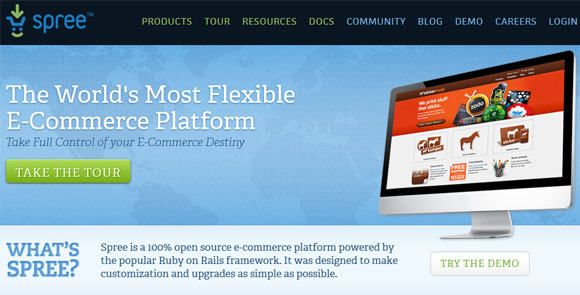
Spree is a 100% open source e-commerce platform, which is developed using the Ruby on Rails framework. It was in the year 2007 when Sean Schofield introduced Spree Commerce to the world. Since its inception, it has been downloaded 179,299 times as of March 21, 2013. It is so powerful that it even attracted many investors and in the year 2011 it received $1.5 million from AOL and True Ventures in seed funding. This is an easy to work with platform, as customization and upgradation of an eStore made using Spree is only a matter of few minutes. Currently, it is being used by some of the industry giants, namely; Sticker Mule, ShoeDazzle, and Coupon Trade.
10-Agora Cart
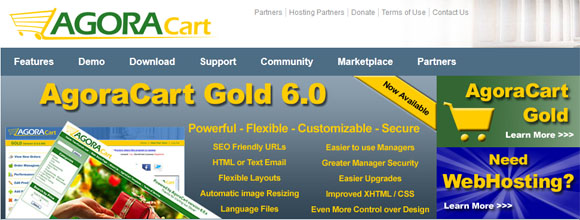
Agora Cart comes in two variants, which includes paid as well as a non-paid version. The paid version has been named as the Agora Cart Gold. However, there’s very minimal difference between the two, and both of them are SEO friendly, and the images used in an eShop constructed using Agora Cart can be resized automatically. One can easily add ‘n’ numbers of categories & products to his/her online store, and can offer them via 10+ Shipping methods, and the payment can be processed via 10+ payment gateways.
11-CubeCart
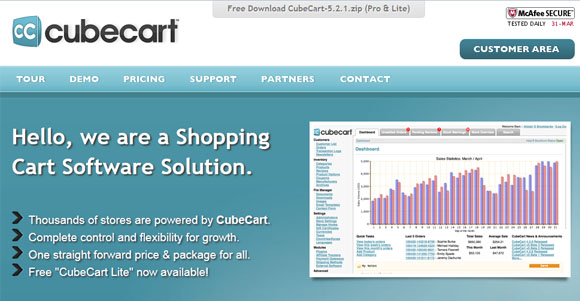
Cube Cart is a flexible, robust, and affordable eCommerce platform. It is available in two variants named Cube Cart Lite and Cube Cart Pro. The Lite version is available for free, but for Pro version one needs to pay $180 as a onetime fee. People using the Lite version can only add 100 customers, and receive 250 orders per month. However, there is no limit for adding products, and categories. It is a complete SEO friendly shopping platform, and comes with six 100% compatible templates. Moreover, for people who love to explore first and buy later, Cube Cart would be a perfect choice, as its Pro version is available for Free under a 14 day trial, for which one doesn’t even need to enter his credit card information.
12-Alegro Cart
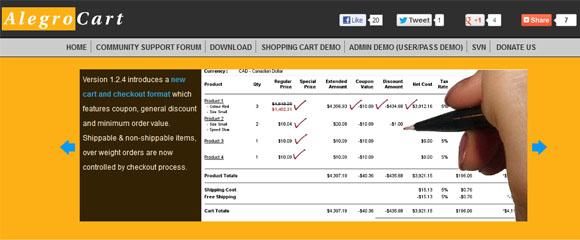
Alegro Cart is one of the most complete open source based ecommerce platform. It offers multiple page display options, dynamic category menu, and variety of module features. It is a complete SEO friendly eCommerce solution, as Meta information gets added to the product pages header dynamically, and SEO URLs gets created automatically. Templates, Color Schemes, and Styles can be selected separately from the admin panel. Moreover, the product pricing can also be offered in multiple ways, which includes Quantity discounts by percentage of a product price.
13-Dash Commerce
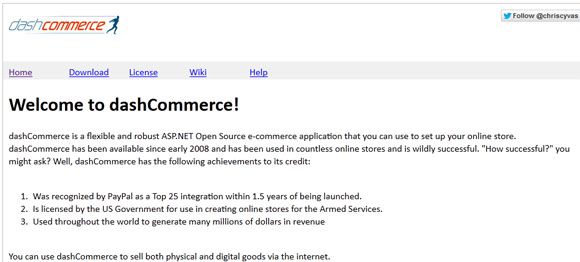
It is a flexible and robust ASP.Net based open source ecommerce platform, which lets the users to setup an online store within hours if not minutes. It’s available since the year 2008, and is being used by a wide community of eStore developers and shop owners. In fact, it is so popular, that PayPal recognized it as the top 25 ecommerce platforms within 1.5 years of its inception. It is also been licensed by the United States government for use in developing eShops for the Armed services.
14-AFCommerce
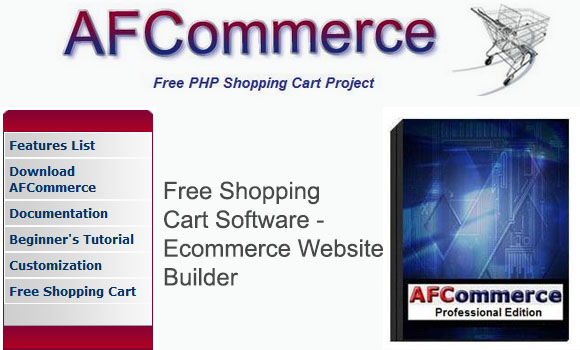
AFCommerce is a complete ecommerce store management platform, with which one can setup a dynamic online shop with tons of awesome features free of cost. It is also an official channel partner of PayPal for all of their payment gateways, which includes PayPal and Payflow. It can be installed, configured and maintained pretty easily and quickly. Moreover, its latest version comes with a website building software that can be integrated with the shopping cart. AFCommerce users can easily master the basics of using it within a matter of 2 to 3 hours. It offers a lightning fast one page checkout, secure and password protected admin area, automatic customer account creation once he makes a purchase.
15-Broadleaf Commerce
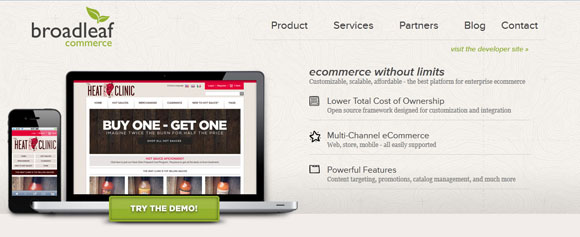
According to its makers and promoters, it is one of the finest, highly customizable, affordable and scalable platforms for enterprise ecommerce. It is available for free, and supports both web and mobile commerce. It comes with a wide range of features, which includes; SEO category and product navigation, personalized content, customizable checkout, full catalog management, etc. However, to start with the Broadleaf Commerce, one needs the latest version of Maven.


